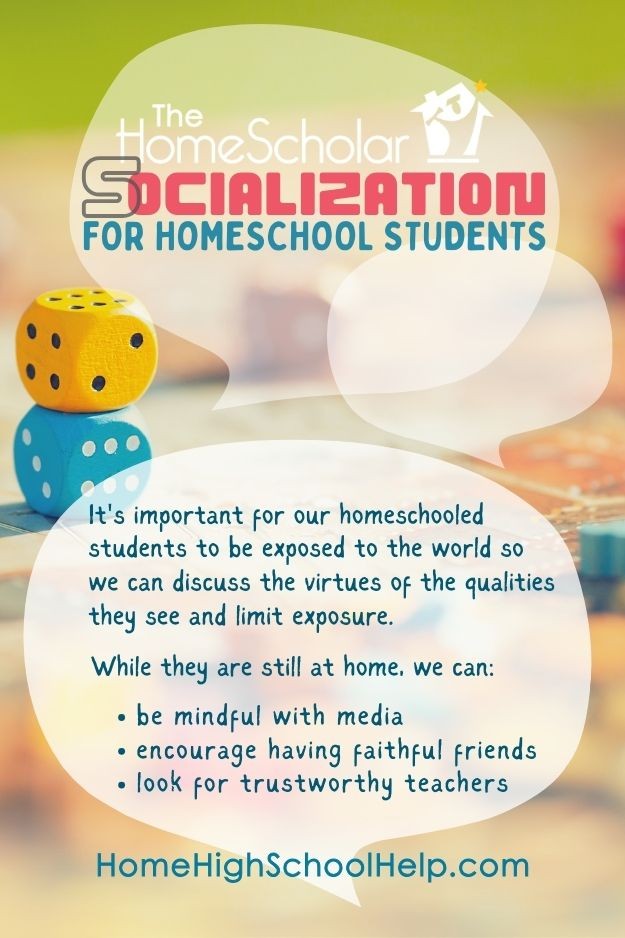Socialization for Homeschool Students
~ A word from our founder, The HomeScholar Emeritus, Lee Binz ~
I was thinking about socialization because of a conversation I recently had with a non-homeschooler. It is unbelievable that this is still such a big topic surrounding homeschooled children, considering that socialization affects all children, no matter how they're educated.
Most parents appreciate a little help and encouragement on their homeschooling journey. Our free newsletter delivers this fresh each month. Click to get some yourself: The HomeScholar Record Newsletter
Socialization is not about a group of kids all the same age. True socialization is about people of all ages getting together. The people your children look up to will shape their attitudes, behaviors, and language - that's what socialization means. Try to find people and influencers that will shape and mold your child into a better person in the future. Look at friends, yourself as parents, tutors, or class teachers. Look at who they listen to including the media they consume and the leaders they admire. Look at social media - those who post are literally called "social media influencers." The language, attitudes, and behaviors of those people will begin to be the same language, attitudes, and behaviors that you will see in your child.
It's important for our homeschoolers to be exposed to the real world - it really is! But at the same time, we can discuss the virtues of the qualities they see and limit exposure while we can - while they are still in our home. That intentional shaping and molding of behavior is how we can raise children into pleasant adults.
When kids are feeling alone, getting out into the world can provide the social interaction they crave. Here are some ideas for socialization:
- Family outings and play-only groups (many support groups offer park days).
- Homeschool skating or bowling events.
- Church and youth groups.
- Volunteer work at food banks, churches, or the YMCA.
- Community classes in art, photography, fitness, etc.
- Sports and fitness groups like swim teams or running clubs.
Call local homeschool groups and ask, "What are some ways your group gets together?"
Separating Socialization from Academics
Mixing peer interaction and school academics is similar to mixing oil and water. They may seem similar. They both involve teenagers who like to talk, right? But they are two completely different things.
In school academics, most of the time students are instructed to be quiet, avoid talking. They are shuffled between classroom, with only a 50 minutes per group of peers in the class. It's often difficult to truly interact with kids in a classroom situation. Even times when kids are working on projects together, or having group discussions they are usually being tightly controlled by a teacher and the clock. Unstructured time to find and make friends at school is very limited.
Some kids want friendships and socialization more than anything. What I often recommend is separating socialization from academics. In other words, look for friends within ACTIVITIES, rather than within school. Try to find classes for art, dance, sports teams, debate, youth groups, etc. to fulfill that need.
It's not as fun to mix academics and socialization as it may sound!
Guiding Social Growth Through Intentional Influence
I was talking to a friend who was condoning some pretty outrageous behavior. She said that was "being real," but I disagree. In my children, I really don't want them doing those things. I want them to grow up to be kind, gracious, gentle, humble, slow to anger, and truthful. There are people in the world who are "real" and still genuinely kind. That's the influence I want for my kids.
We want to raise our children to think and speak on good things, not just to others but also in their self-talk.
As I was thinking about it, these two verses came to mind.
"Whatever is true, whatever is noble, whatever is right, whatever is pure, whatever is lovely, whatever is admirable—if anything is excellent or praiseworthy—think about such things." Philippians 4:8
"Love is patient, love is kind. It does not envy, it does not boast, it is not proud. It does not dishonor others, it is not self-seeking, it is not easily angered, it keeps no record of wrongs. Love does not delight in evil but rejoices with the truth. It always protects, always trusts, always hopes, always perseveres." 1 Corinthians 13:4-7
If you enjoy scripture and applying it to homeschooling, you might like Finding the Faith to Homeschool High School: Weekly Reflections for Weary Parents. My friend Dorothy had this to say about my book, "It is as though a friend has sat down beside you to whisper needed encouragement into your tired, anxious ears. Having second thoughts about your calling to educate your children outside of the school context? Lee's beautiful weekly devotional will turn your heart back towards God and your children." — Dorothy Murphy, Home Educating Parent and Exam Tutor, United Kingdom
Who your child hangs out with and watches everyday influences who they become. Because you homeschool, you can encourage them to spend time with those who will lead and inspire them to grow into a kind, loving adult.

 Login
Login









.jpg)

Comments 2
I have 20 grandkids, 11 of whom are/have been home schooled. I occasionally have people comment on their concern for home schooled kids' socialization. I really don't see a problem with it. My home schooled grandkids are doing fine. They don't have some problematic friends that public schooled kids sometimes have. They aren't listening to non biblical teachings that public schooled kids sometimes have to listen too. They are polite, sweet, well mannered, articulate, kids who can carry on an intelligent conversation with friends and adults.
I don't see why people worry about home schooled kids not being socialized! Just because they are home schooled doesn't mean they are raised in a box! They still have friends. They interact with neighbors, public schooled kids, they go out in the world and meet people and interact with them.
There is more than one way to teach a child! And one is not necessarily better/worse than another. They are perhaps different. Kids learn differently so why can't they be taught in different ways? It doesn't necessarily make it bad. Just different.
Exactly, TheMimi!!
I homeschooled for 20 years, and I used to ask people (after they stated their concern for our children's lack of social opportunities) "What do your children do in the summer? Don't they do things outside of your home? Baseball, swimming, time with neighborhood friends? That's what my children do all year, in addition to play groups, co-op classes, volunteering, youth group, etc. In fact, our biggest challenge is LIMITING our social time. There is no lack of social interaction in homeschooling."
Robin
Assistant to The HomeScholar